Former Finance Minister Chatib Basri said on Tuesday in Jakarta that Indonesian President Joko "Jokowi" Widodo needs to implement reforms in the labor sector if he wants to drive the economy through attracting foreign investments.
According to Bloomberg, Chatib argued that Indonesia cannot fully benefit from the China-U.S. trade war because many foreign investors are wary of the country's employee severance packages.
Data from the World Bank states that Indonesia covers around 95 weeks of severance pay for workers who have been in a company for 10 years. The figures are large enough for foreign investors to shun Southeast Asia's biggest economy due to this policy.
For Chatib, Jokowi should work quickly in overhauling Indonesia's labor policies so investors moving away from China and the U.S. will find the country suitable for relocation and increased production.
Compared to Vietnam's 43 weeks of severance pay coverage, Indonesia's 95 should be decreased so improve the latter's factors of attracting relocating companies and new foreign investments.
Chatib further explained that foreign investments are huge economic drivers but until Indonesia finds a way to revamp its workforce policies, Jokowi's goal of achieving a seven percent growth rate will likely be far from reality.
"Without that, and because of limitations of monetary and fiscal policy, Indonesia will remain stagnant and trapped with 5 percent economic growth," Chatib pointed out.
Despite some lowered confidence for Jokowi's ability to rise above the economic challenges he is faced with, some experts believe the re-elected chief can push Indonesia to overcome internal and external beatings.
Last month, international rating firm Standard & Poor (S&P) increased its credit rating of Indonesia from BBB- to BBB, citing solid economic development targets and stable policies.
Economic analysts noted that the push in credit rating appears to be a move of support for Jokowi's second term following his victory over Prabowo Subianto in this year's general elections.
Debates have been raging regarding Jokowi's abilities and targets for the country this year. Hopes are high that he will implement the reforms that he wasn't able to tackle in his first term as president.
Jokowi said during his first term that he aims to up the Indonesian economy to reach seven percent growth. The country has only settled around five percent ever since he reigned. However, it appears that he is exploring other opportunities regarding foreign investments.
Last week, the Transportation Ministry confirmed that it is studying a Jokowi proposal revolving around the probability of getting foreign airline companies to make room for domestic routes.
Jokowi's goal is to reduce airfare for Indonesians by enticing foreign airline leaders to cater to domestic flights in the country. The Ministry said it is reviewing the proposal but early hints suggest that the ministry is against the scheme further proving the country's hesitance towards opening up.






